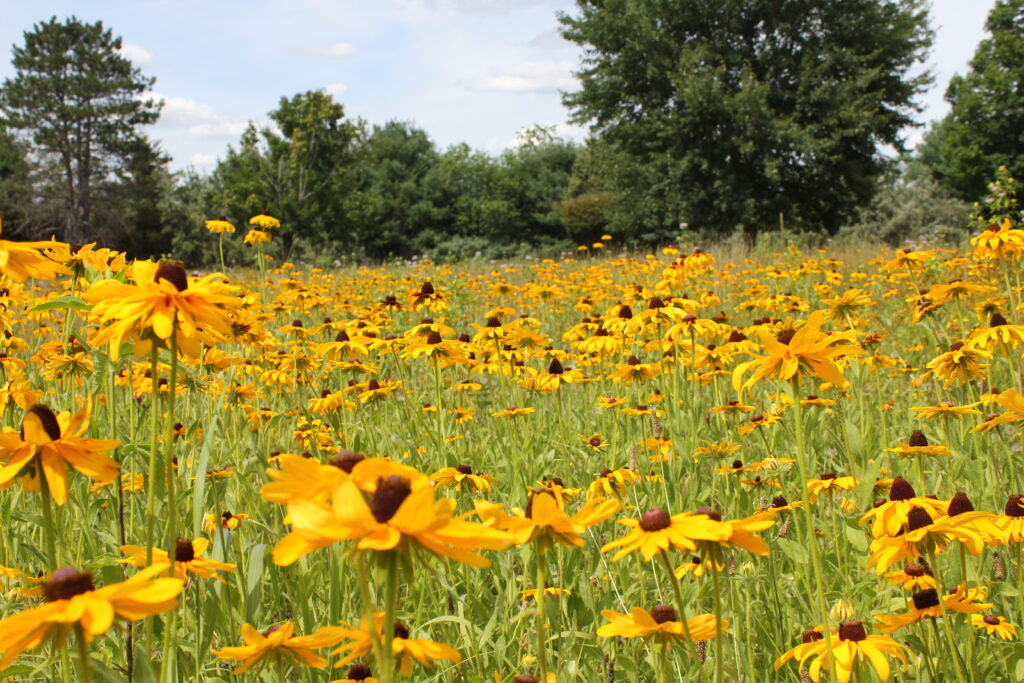
Two UConn professors are working to help the ecosystems of New England roadsides to flourish again and raise awareness of sustainability impacts.
In the fall of 2021, Julia Kuzovkina and John Campanelli applied for a grant that would allow them to finance their project. There are many purposes for planting native plants along the road. It is mainly to help wildlife, especially pollinators, many of which are endangered. But there is also an economical advantage, as native plants need less maintenance than introduced species.
Kuzovkina is a professor in the Department of Plant Science and Landscape Architecture. Campanelli is a doctoral candidate studying conservation biology in the same department. Both of them have been working on that project since their grant was accepted in June 2022.
With this project, they gather the help of different people: farmers, specialists and stakeholders such as the Northeast Seed Network. The Department of Transportation is also working with them towards a more sustainable path.

UConn student Samuel Kocurek is also part of the project. His role is to compile and manage the data of this project. In addition, he works on a sustainability program at UConn where he encourages the use of data plants for landscaping on campus to improve pollinators’ health.
One of the main focuses of this project is the production of a seed collection called ecotypic seeds. There are none in New England and their goal is to change that. Ecotypic seeds are special because they are found in the areas where they are supposed to grow, which allow a better adaptation to the climate.
Native plants are also more sustainable because they don’t need to be mowed as often. Their roots are deeper which helps to control erosion phenomena and pollinators.
According to Campanelli, New England falls far behind other regions. Their priority is to close that gap and concentrate on developing the use of native seeds in New England.
Part of New England’s delay is due to the cost of the land, but also the fact that it is not an agricultural economy. However, part of it is also the reluctance of bureaucratic agencies.
According to Campanelli, the change is wanted, but changing local mentalities is a long process. This reluctance is mainly due to the current laws that are not always designed for sustainable projects, but is also due to people’s knowledge base which can be hard to change.
“Unless they are required to act, they don’t act,” Campanelli said.

Kuzovkina said, “the change will come when we get new regulation, and now, we are preparing the foundation: knowledge.”
It is essential to reintroduce native species in order to help pollinators and wild species. Because of roadsides, landscapes are fragmented. Having native plants along them will create corridors that will allow pollinators to migrate from patch to patch to find nectar resources.
Demonstration plots are going to be launched this spring and fall in three states, including Connecticut, Massachusetts and Vermont, along route I-91. However, it will take several years for these biodiverse meadows to establish, so the results will come after the research is complete.
According to Kuzovkina and Campanelli, everybody has a role to play in helping pollinators and creating a more sustainable landscape. People can also plant native species in their garden to help those disconnected landscapes join again.
Campanelli explained that one part of the project is to make surrounding farmers and people take part in the project by planting native species.
Students can also help by installing small gardens for pollinators. Flowers and plants are already a good contribution to the ecosystem.
Campanelli added that even if some people are reluctant about this project, what matters is to take baby steps. Kuzovkina and Campanelli hope that the demonstration sites change people’s minds and will demonstrate to the DOT that native plants are worth it.